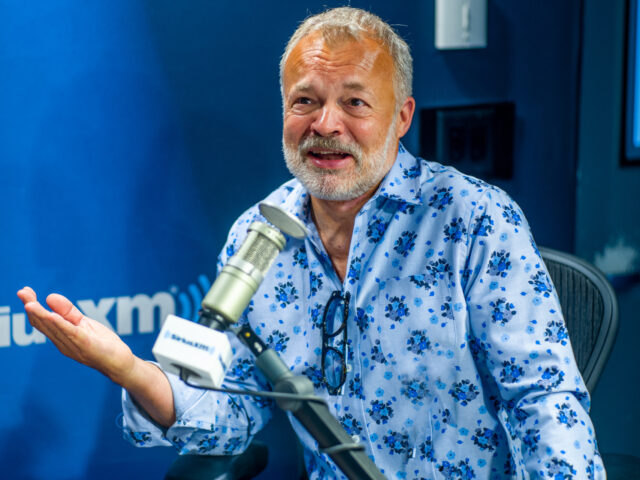One of the BBC’s most prominent presenters has admitted that he pursues a “liberal agenda” with his prime-time late-night television show.
Graham Norton, one of the BBC’s best-known talents, has admitted that he pursues a “liberal agenda” with his prime-time talk show, which regularly airs on the UK’s BBC state-owned broadcaster on Friday nights.
Despite being mandated to be politically neutral, the broadcaster has long been slammed for having a left-wing slant, with the organisation often being accused of putting disproportionate emphasis on racial and transgender diversity within its hiring processes.
In an interview with The Sunday Times, Norton admits that his own show has “a liberal agenda”, though justifies such an agenda as helping to better “reflect” the world we live in.
“I guess it is a liberal agenda, but reflecting the audience back at themselves doesn’t seem wildly liberal unless you only want to see yourself staring back at you from the TV,” Norton told the publication.
“There was a time when you would scrabble to find a non-white actor the audience would recognise,” the Irishman — who originally hails from County Cork — continued. “That’s not the case any more. Whatever the guest has done has been popular enough to get them on the sofa, and you want the world to be reflected.”
Nevertheless, while Norton seemed reticent at the idea of having someone with “right-wing” views come on his show to discuss their political position, he backed the idea that they should not be banned from television, and that it was important to talk to people who you disagree with.
In particular, the BBC presenter discussed having controversial author J.K. Rowling on his radio show recently to talk about her new novel, with the presenter saying that it is right for the major literary figure to have the opportunity to talk about her new artistic projects despite her politically incorrect views on transgenderism.
“…I wouldn’t have her on to air her views,” Norton admitted. “But she has the right to still wang on about her crime novel.”
“The easiest thing would be to not have her on, but that didn’t seem right,” the Corkman continued, noting that he was not the “moral arbiter of the world who says who can be on TV or can’t”.
“We should talk to people that we disagree with and I would not further any cause by not having her on,” he went on to say, though alleged that “it’s very hard to find a right-wing guest”.
“[A]nd, if you do, the audience probably don’t want to see them,” Norton claimed.
The television host’s admission that his show pushed a “liberal agenda” is only the latest in a number of instances where the BBC’s left-wing bias has come to the fore, with the state-owned broadcaster previously being slammed for seemingly over prioritising diversity in its programmes and hiring schemes.
For example, the BBC has long defacto banned white people from occupying certain positions in the broadcaster, openly publishing job listings that describe themselves as being for people from “Black, Asian and non-white minority ethnic” (BAME) backgrounds.
Meanwhile, a report into the British television industry as a whole found that ethnic and sexual minorities were vastly overrepresented on screen, with BAME actors making up a massive 23 per cent of television roles. This is despite the fact that the BAME population in Britain is around 14 per cent.
While the BBC also has diversity quotas aimed at boosting the number of women in the organisation, these have reportedly been somewhat undermined by the practice of hiring transgender individuals who are genetically male.
Such a practice has now prompted accusations that the broadcaster is “disappearing women” from unhappy feminists.
“The BBC has now ‘disappeared’ women as a sex class and instead monitors ‘gender identity’,” one senior whistleblower in the organisation — who reportedly described the BBC as being “deeply sexist” — reportedly said in regards to the corporation’s hiring practices.

COMMENTS
Please let us know if you're having issues with commenting.